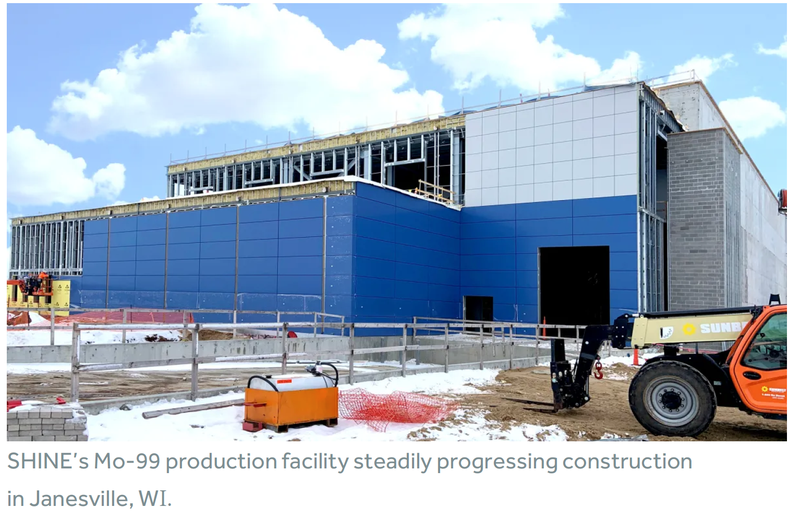Department of Energy, SHINE Technologies Sign Contract for Production of Mo-99
 SHINE Technologies has signed the first contract with the Department of Energy’s National Nuclear Security Administration (NNSA) and Office of Environmental Management (DOE-EM) under the Department’s Uranium Lease and Take-back Program for the production of molybdenum-99 (Mo-99). Mo-99 is a medical radioisotope used in over 40,000 daily medical diagnostic procedures across the US to assist in diagnosing life-threatening diseases, including heart disease and cancer.
SHINE Technologies has signed the first contract with the Department of Energy’s National Nuclear Security Administration (NNSA) and Office of Environmental Management (DOE-EM) under the Department’s Uranium Lease and Take-back Program for the production of molybdenum-99 (Mo-99). Mo-99 is a medical radioisotope used in over 40,000 daily medical diagnostic procedures across the US to assist in diagnosing life-threatening diseases, including heart disease and cancer.
The NNSA’s lease contract will provide SHINE with the low-enriched uranium necessary to produce Mo-99, while SHINE’s contract with DOE-EM details requirements surrounding the return of any resulting radioactive waste without a commercial disposition path once Mo-99 production is complete.
“Signing these contracts with SHINE is a crucial step toward medical isotope autonomy for the United States,” said Corey Hinderstein, NNSA Deputy Administrator for Defense Nuclear Nonproliferation. “Once SHINE begins production, our country will be that much closer to creating a reliable and sufficient supply of these life-saving materials right here at home, while also increasing nuclear security by reducing the use of highly enriched uranium.”
The American Medical Isotopes Production Act of 2012 directed DOE/NNSA to establish a program to make uranium available to medical isotope producers in the United States. Although the Act also requires DOE to establish take-back contracts for spent nuclear fuel and radioactive waste resulting from medical isotope production without a disposal path, there is no spent fuel or radioactive waste involved in these contracts.
SHINE is steadily progressing toward Mo-99 production capability at its plant located in Janesville, WI.
“We are incredibly proud to partner with the NNSA and DOE to be deploying an integrated irradiation and processing facility to manufacture U.S.-based, high-specific-activity (HSA) Mo-99 that millions of patients rely on every year throughout the U.S.,” said SHINE CEO Greg Piefer. “We consider the ability to produce HSA Mo-99 without the need for highly enriched uranium to be a huge win for both patient access to essential medical diagnostic procedures, and for nuclear security.”
SHINE is also one of the DOE/NNSA’s cooperative agreement partners. As announced in October 2021, NNSA awarded SHINE an additional $35 million to support their efforts to produce Mo-99 commercially by the end of 2023. This award is part of the DOE/NNSA financial assistance efforts to establish a reliable, U.S.-produced supply of Mo-99, without using highly enriched uranium. NNSA has implemented this effort by competitively awarding cost-shared cooperative agreements to commercial entities, as well as providing funds to DOE’s National Laboratories to support development of non-highly enriched uranium Mo-99 production technologies.